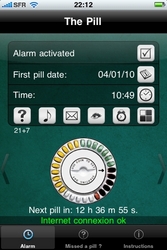 There are a number of web sites and mobile applications for tracking one’s cycle (such as MyMonthlyCycles.com) and for tracking PMS – either one’s own or someone else’s, as frequent guest contributor David Linton pointed out a few months ago. Is anyone surprised that there is also an app to remind you to take your birth control pill every day?
There are a number of web sites and mobile applications for tracking one’s cycle (such as MyMonthlyCycles.com) and for tracking PMS – either one’s own or someone else’s, as frequent guest contributor David Linton pointed out a few months ago. Is anyone surprised that there is also an app to remind you to take your birth control pill every day?
Of course, if you’re going to take oral contraceptives, taking it consistently is important. With a short half-life and low dosage in many of today’s pills, ideally they should be taken at the same time each day for maximum effectiveness. (This also may reduce breakthrough bleeding.) Research indicates that the average birth control pill user misses three pills each month, which changes the failure rate from 0.3% to 8%.
The commonly used Dialpak® dispenser, introduced in 1965, was designed to make it easy to remember to take the pill every day, long before iPhones or internet access. Legend has it that it was invented by a fellow who frequently argued with his wife over whether or not she had taken her pill. The Dialpak® is iconic in American culture; it has made the birth control pill the only prescription drug identifiable at a distance simply by its container. It is even evoked in the perfectly circular swimming pool and costumed synchronized swimmers of the NuvaRing® advertisement frequently seen on American television.
These ads (“Break Away from the Pack”) promote NuvaRing® for those who can’t be arsed to take a pill every day, rather than any claims of its effectiveness as birth control. (Needless to say, the ads neglect to mention that the ring can be accidentally expelled surprisingly easily. That’s got to impact its effectiveness rate.)
Physicians refer to failure to take one’s medication as “non compliance”, as though patients – especially female patients – are deliberately defiant rather than forgetful. But wouldn’t a real rebel be more likely to reject hormonal contraception completely in favor of Fertility Awareness and/or barrier methods? And she’d employ reusable menstrual products, too.
[via Holly Grigg-Spall]


Thank you Liz for linking folks to the Justisse site. FYI there is a free on-line guidebook for those who want anonymity or have few financial resources.
Best Regards
Geraldine
And yes, real rebels are ditching the pill and looking to alternatives like Fertility Awareness. But they’re not finding a lot of support from their doctors.
https://www2.macleans.ca/2009/11/23/ditching-the-pill-for-good/
Doesn’t it just illustrate how medicalized birth control has become? When a “patient” forgets to take three pills a month and gets pregnant, it is never considered “method failure”. She is just a “non-compliant” patient. But if a woman charting her menstrual cycles decides to risk unprotected intercourse on a potentially fertile day, it is absolutely called “method failure”. And considered a damn good reason not to use this method of birth control at all! Likewise, the abstinence only crowd will never acknowledge that if a young person takes a “chasity vow” and then has sex and gets pregnant, it was NOT the method (abstinence) that failed, but the young person. (I’ve read in some places that the “typical use” failure rate for the pill is as high as 20%.) Lots of double-speak going on here. Or maybe that should be “double standard”.
I just use my (non-iPhone) cell phone alarm. Goes off once a day at the same time. I don’t see why an app is necessary, honestly.
I agree, NotEmily. Numerous alarms and mnemonics (such as the Dialpak® itself, as I indicated, or leaving the pill pack next to tooth brush) are readily available, obviating the need for a pill-specific app.